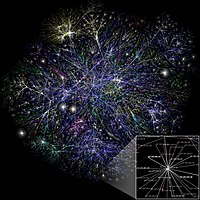
Photo from wikipedia
The recently proposed DeGroot–Friedkin model describes the dynamical evolution of individual social power in a social network that holds opinion discussions on a sequence of different issues. This paper revisits… Click to show full abstract
The recently proposed DeGroot–Friedkin model describes the dynamical evolution of individual social power in a social network that holds opinion discussions on a sequence of different issues. This paper revisits that model, and uses nonlinear contraction analysis, among other tools, to establish several novel results. First, we show that for a social network with constant topology, each individual's social power converges to its equilibrium value exponentially fast, whereas previous results only concluded asymptotic convergence. Second, when the network topology is dynamic (i.e., the relative interaction matrix may change between any two successive issues), we show that the initial (perceived) social power of each individual is exponentially forgotten. Specifically, individual social power is dependent only on the dynamic network topology, and initial social power is forgotten as a result of sequential opinion discussion. Finally, we provide an explicit upper bound on an individual's social power as the number of issues discussed tends to infinity; this bound depends only on the network topology. Simulations are provided to illustrate our results.
Journal Title: IEEE Transactions on Automatic Control
Year Published: 2018
Link to full text (if available)
Share on Social Media: Sign Up to like & get
recommendations!